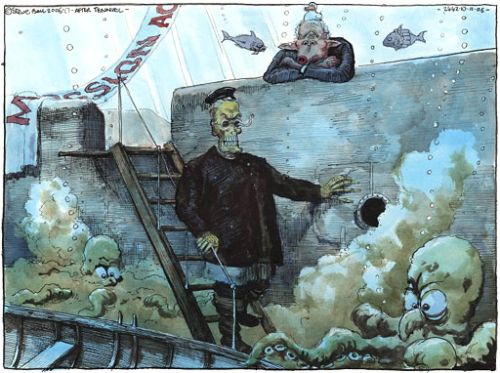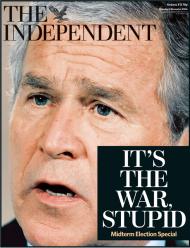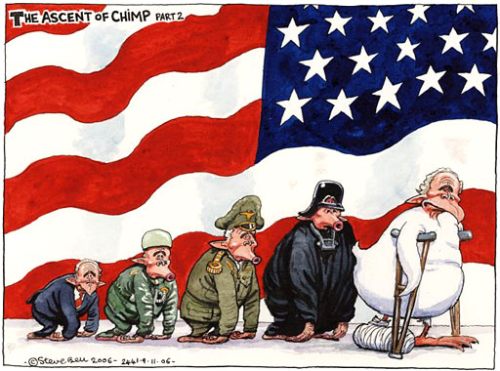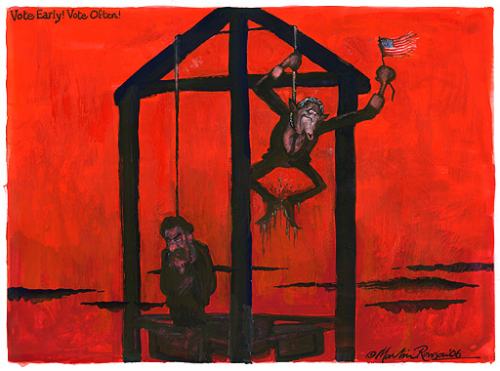Long and bumpy road to building a 'new' Iraq
Hisahiko Okazaki / Special to The Yomiuri Shimbun
The situation in Iraq seems truly bad. The clearest indication of this is the rising death toll of U.S. troops. In March, the figure fell to about one a day, casting a ray of hope that the terrorism in Iraq was finally abating. The tolls, however, started to increase shortly afterward. In October, U.S. military deaths stood at more than 100. As well, the number of Iraqi civilian fatalities is reportedly far higher than that of U.S. military personnel.
There are no signs of the situation changing for the better.
Under the circumstances, there is no hope in the foreseeable future of a rise in investment and business activities in Iraq, or a surge in oil production--the base of the country's economy.
Areas such as Anbar Province in the western region have reportedly plunged into a state of nearly intractable lawlessness.
Making condemnations in retrospect as to why things have evolved so abominably is quite easy to do.
Some may say it was wrong to start a war without ascertaining whether weapons of mass destruction were in Iraq and to what extent the Al-Qaida terrorist networks were implicated in the Iraqi situation. One could also say that it was wrong for Washington to give credence to theories that the Iraqi military would likely revolt against Saddam Hussein once the United States began its invasion of Iraq. Or, some could say it was wrong for the United States to employ forces in the initial stage of the war that were excessively small in scale, contrary to warnings by U.S. Army leaders.
===
Beyond anybody's guess
All of these arguments are probably valid.
Misjudgments like the ones in the Iraq war, however, are mostly unavoidable in any military operation. Yet the realities of this war seem to be horrible enough that anyone could have predicted them.
In fact, U.S. President George W. Bush said in an address in May that things unimaginable in civilized countries have been taking place in Iraq, apparently admitting that the current state of affairs in Iraq is beyond the range of his expectations.
The problem is what should be done in the face of this situation.
[snip]
There is a possibility that a worst-case scenario in Iraq could prove to be far more dreadful than one in Afghanistan.
[snip]
From a long-range, historical point of view, what the United States has done and is still doing in Iraq is bringing a cataclysmic change to a "human ecology," or the totality of interrelationships of people and their political systems, in the Middle East.
Before the Iraq war, the Sunnis, a minority in the country, were at the core of the bureaucracy and military of Iraq. The Sunni-centered government managed to maintain security both domestically and externally, while the strong-arm government was potent enough to suppress religious protests and maintain secularism, effectively prohibiting activities of Islamic extremists.
That regime, which was fairly stable in its own way, has ended.
Before the war, Iran was surrounded by archrivals -- Iraq in the west and the Taliban government in the east. U.S. forces broke down both the Hussein and Taliban regimes and liberated Iraqi Shiites, paving the way for the creation of pro-Iran forces in Iraq. This means Iran has now found itself blessed with a windfall, obtaining a position as a power of pivotal significance in Middle Eastern affairs.
One factor behind the sharp increases in oil prices, which are conducive to boosting Iran's influence, is undoubtedly the situation in Iraq.
These are all consequences of the U.S. interventions in the Middle East.
[snip]
===
Ideals vs realities
Americans, particularly those called neoconservatives or neocons, dreamed of creating a new human ecology in the Middle East on the basis of the principles of freedom and democracy. Their dream itself can undoubtedly be considered a lofty goal.
The success in accomplishing such goals in Japan and Germany after World War II was due largely to the fact that both countries had experiences of democracy that flourished in the 1920s, prior to rampant militarism in Japan and Nazism in Germany, so that their postwar democratization was just a resurrection of the prewar democracy. It is now known that attempts to create a new human ecology of democracy on soil lacking legacies of democracy are bound to take time and efforts immeasurably greater than in the cases of Japan and Germany.
To cite the instance of Afghanistan again, it is unlikely that a new breed of human ecology can be established there before the girls currently attending primary and middle schools become adults and their children also receive education in a similar way, with freedom and democracy kept intact. The process will therefore most likely take one generation, or roughly 30 years, to bear fruit.
So what should the United States do in light of such outlooks? It is, of course, a decision the United States will make on its own.
In regard to the proverb, "Onlookers see more of the game than the players do," I would like to say that Washington needs to thoroughly change the current war direction and formulate a new posture across party lines with the cooperation of middle-roaders among Democrats so as to hammer out a new policy based on a long-range strategy.
To cut back on U.S. troops deployed in Iraq and Afghanistan in the process would be highly desirable. However, if, unfortunately, that turns out to be impossible in light of the current situation, the United States will have no choice but to keep troops stationed there for the next few years, which may even require augmenting its standing forces.
While the issues mentioned above should be left up to the people of the United States, what can Japan do as Washington's ally?
What is of foremost importance is to bear in mind that the United States will certainly be driven into a serious position in domestic politics and foreign policy, as well as fiscal conditions, for a considerably long time in the future.
Finding fault with our friend over what has already been done is of little use.
When then Prime Minister Junichiro Koizumi went on his final official trip to Washington, a U.S. newspaper carried an article that began with the words, "Japan remains a friend in word and deed." It stated that even though some claimed the United States had alienated the rest of the world, Japan had remained its true friend. Koizumi's legacy of boosted mutual trust between the two countries should be kept unmarred.
===
Sharing the burden
Member states of NATO, despite grumbling about Washington for one reason or another, are extending assistance to the United States in response to its requests for new batches of troops to be deployed in Afghanistan and Lebanon.
Japan, for its part, should also help the United States by taking on part of its burdens, in one form or another. The Air Self-Defense Force's logistic support for the U.S.-led coalition forces in Iraq, as well as the Maritime Self-Defense Force's refueling support activities for backing antiterrorism operations in the Indian Ocean, should be continued and increased, if necessary.
The Cabinet of Prime Minister Shinzo Abe is better advised to take a further step forward in consolidating even more firmly the basis of Japan-U.S. relations.
Should the Cabinet agree to exercise the right of collective self-defense regarding MSDF activities in the Indian Ocean--allowing it to engage in not only refueling operations but also stage joint-patrolling activities with the United States on both high seas on the oil-transport route and international sea lanes to the Persian Gulf--the alliance between Japan and the United States would certainly be strengthened drastically.
Doing so would be greatly beneficial to ensuring the nation's long-term security and prosperity, as well as contributing to the peace and stability of the Asian region as a whole.
Okazaki served as Japanese ambassador to Saudi Arabia and Thailand. He is currently a guest research fellow at the Yomiuri Research Institute.
(Nov. 5, 2006)
Long and bumpy road to building a 'new' Iraq - The Yomiuri Shimbun





